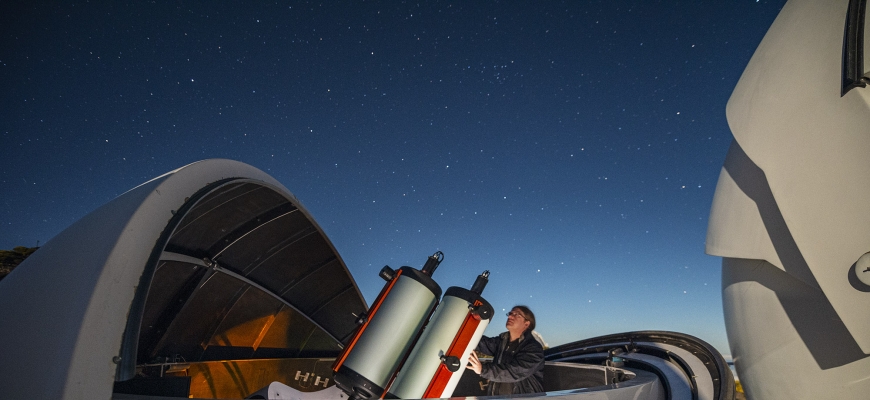
Photography that aims to shed new light on our relationship with space and the need to protect it will be made available to the public for the first time in a free urban exhibition.
Our Fragile Space: Protecting the Near-Space Environment, will bring a range of images designed to raise public awareness around the vulnerability of space surrounding our planet to the Coventry Cathedral Ruins in May, in partnership with the University of Warwick.
The project, from renowned photographer Max Alexander, is supported by the Habitability Global Research Priority (GRP) and the Centre for Space Domain Awareness (CSDA) at the University of Warwick, to promote awareness of the global problem posed by an ever-increasing amount of space debris.
The Habitability GRP is proud to have sponsored Our Fragile Space, beginning with a private exhibition at Lloyd’s of London, followed by Spaceport Cornwall, and arriving in Coventry as part of the University of Warwick’s Resonate programme, which aims to help the public to engage with cutting-edge research through accessible events.
The exhibition features 75 images in a combination of landscape, long-exposure, reportage photography, and interpretive portraits, linking near-space more closely with dialogues around pollution in oceans and in the Earth’s atmosphere, revealing the people, technology, places and institutions that are enacting positive change and research to protect space and encourage new ways of thinking.
Coventry Cathedral’s Ruins will be the first public location to host the exhibition. The Habitability GRP hopes that this unique and evocative outdoor location will enable viewers to reflect on their understanding of the skies above: from limitless expanse and site of threat in the November 1940 Blitz, to a fragile and threatened environment.
Max, who is a Fellow of the Royal Astronomical Society, said: “The exhibition dovetails with vital, cutting-edge research that is being carried out by the University of Warwick around the overpopulation of the near-space environment, specifically Low Earth Orbit (160km to 2,000km from Earth), where many of the mega-constellation satellites are in orbit.”
“Space is crucial to modern life, and so we must explore how we can behave responsibly in space, and think about the precautionary perspective we should be taking. We hope that through this collaboration, we can reach new audiences and raise awareness of an issue that will only be resolved by the public, the government, scholars and industry working together.
“It is a problem that’s not fully understood, and it has been a privilege to work with the University of Warwick over the last three years in a bid to develop near-space dialogue alongside discussions around climate change, generate awareness of the scale of the problem, and facilitate a change in thinking around the fragility of space and the need for responsible stewardship.”
Don Pollacco, Director of the CSDA and Professor in the University of Warwick’s Department of Physics, said that the exhibition is helping make sense of an important issue. He said: “We have become dependent on the satellites that orbit above our heads as they supply us with many services ranging from TV and communications to banking and even improving our farming efficiency.
“However, our use of space is jeopardised by our lack of an environmental consideration of the effects of an exponential increase in space craft and the debris that these and existing satellites leave behind when they finish their operational phase.
“We need to understand this space junk population and clean up the space around the Earth before the risks make routine space activity untenable.”
Following its Coventry residency, the exhibition will head to the United Nations in Vienna for COPUOS (UN Committee on Peaceful Uses of Outer Space) and Jodrell Bank in Cheshire including during the Bluedot Festival. It will tour nationally and internationally for the next two years.
For more information visit www.resonatefestival.co.uk/events/our-fragile-space
Caption:
OFS 2: DEBRIS TRACKING FROM LA PALMA, CANARY ISLANDS
Space. Working with Professor Don Pollacco and Warwick University colleagues, Paul Chote has developed and operated the CLASP telescope to track space debris, which varies in brightness as it tumbles through space
